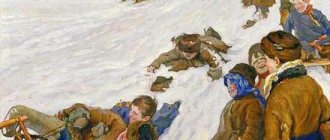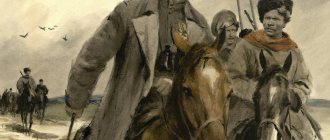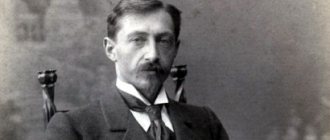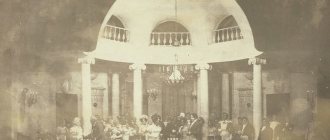Alexander Ostrovsky: childhood and youth
Ostrovsky Alexander Nikolaevich, whose biography is studied in the school literature course, is a realist writer of the 19th century. To understand who Ostrovsky is and how his talent was formed, let’s look at the main milestones in the creator’s life. Ostrovsky’s biography will briefly tell you about how his personal development took place:
- Ostrovsky in childhood.
The main questions that schoolchildren are looking for answers to are where Ostrovsky was born and when it happened. Here's the short answer:
- The writer’s birthplace is Zamoskvorechye, Malaya Ordynka.
- Time - April 12 (new style) 1823.
Lesson plan “Essay on the life and work of A.N. Ostrovsky"
SKETCH OF THE LIFE AND WORK OF A. N. OSTROVSKY
Goals:
arouse interest in the life and work of the playwright; introduce the main stages of Ostrovsky’s creative path and find out how the playwright’s views changed throughout his creative career; talk about Ostrovsky’s social activities and his role in the creation of the Russian national theater; determine Ostrovsky’s place in the literary and ideological struggle of the 19th century.
Visual aids: presentation, illustrations of productions of Ostrovsky’s plays at the Maly Theatre, photographs of actors who played in Ostrovsky’s plays.
During the classes
Epigraph for the lesson:
Why do they lie that Ostrovsky is “outdated”? For whom? For a huge number of people, Ostrovsky is still completely new - moreover, quite modern, and for those who are refined, looking for everything new and complicated, Ostrovsky is beautiful, like a refreshing spring from which you will drink, from which you will wash, from which you will rest - and again on the road.
A. R. Kugel
I. Teacher's opening speech.
Life and work of A. N. Ostrovsky
Alexander Nikolaevich Ostrovsky (1823–1886)
- a talented Russian playwright and theater figure. During his creative life he wrote more than 50 plays.
But the reader discovers in him a sharp satirist, a writer of everyday life of merchants, a dramatic poet, and a lyricist.
Ostrovsky was born in 1823 and spent his childhood in one of the districts of Moscow - Zamoskvorechye, where merchants and artisans lived.
His father, Nikolai Fedorovich Ostrovsky, had a private legal practice. Mother - Lyubov Ivanovna Savvina, the daughter of a Moscow priest, was distinguished by her beauty and high spiritual qualities.
After the early death of the mother, the stepmother took care of the upbringing and education of the children.
In 1840, Ostrovsky successfully graduated from the prestigious First Moscow Gymnasium with a humanitarian focus and continued his studies at the Faculty of Law of Moscow University.
But the future playwright was interested in art. He attended performances at the Moscow Maly Theater, read and wrote a lot, and became interested in music. Having lost interest in his studies, Ostrovsky left the university and decided to take up literature.
Since 1843, at the insistence of his father, Ostrovsky began working as a clerk in the Moscow Conscientious Court, where criminal and civil cases were heard.
Since 1845, Ostrovsky served in the Moscow Commercial Court. Work in the courts enriched the life experience of the future playwright and gave him knowledge of the language, life and psychology of various segments of the population.
II. Explanation of new material.
Teacher's lecture (summary).
1. Stages of the creative path of A. N. Ostrovsky
1847–1851 – the beginning of literary activity, the formation of Ostrovsky’s literary and aesthetic views under the influence of articles by Belinsky and Herzen. Writing an essay “Notes of a Zamoskvoretsky resident.” The purpose of the essay is to describe the life and types of Zamoskvorechye.
In his autobiographical notes, A. N. Ostrovsky wrote: “The most memorable day of my life for me: February 14, 1847... From that day on, I began to consider myself a Russian writer and, without doubt or hesitation, believed in this calling.” It was on this day that Ostrovsky read the first drafts of the comedy “Bankrupt,” which was later called “Our People – Let’s Be Numbered!” The play was completed in 1849. The characteristic merchant types, life, and environment were depicted exclusively through the dialogues of the characters. The play was a success.
Speeches by students with a brief overview of the content of the comedy “Our People – Let’s Be Numbered!”
Review by V.F. Odoevsky: “I consider three tragedies
: “Underage”, “Woe from Wit”, “The Inspector General”. On “Bankrupt” I put number four.”
1852–1854 – the Muscovite period in Ostrovsky’s work. This is the time of active participation of the playwright in the magazine “Moskvityanin”. Creation of the plays “Don’t get into your own sleigh”, “Poverty is not a vice”, “Don’t live the way you want”. The playwright takes a different approach to depicting the types of Russian merchants: he admires the patriarchal relationships that developed in merchant families between the owners and their servants and workers.
1855–1860 - the pre-reform period, when Ostrovsky became close to the editors of Sovremennik and published his works in the magazines Sovremennik and Otechestvennye zapiski: “The characters didn’t get along!”, “Profitable place” and others. The best work of this period is “The Thunderstorm” (1859), which I. S. Turgenev described as “the most amazing, magnificent work of the mighty Russian... talent.”
1861–1886 - the post-reform period, which lasted until the death of the playwright. Ostrovsky writes satirical plays reflecting the life of post-reform Russia: “Mad Money”, “Dowry”, “Talents and Admirers”, “Guilty Without Guilt”, “Forest”, “Wolves and Sheep”, the fairy tale “The Snow Maiden”. Before the reader pass representatives of the bankrupt nobility (“Mad Money”): Cheboksarov, Kuchumov, Telyatev, Glumov... They are united by the fact that they live on “mad money”, which comes to them by chance and, naturally, does not stay long.
Moral decay also affected the elderly landowners Gurmyzhskaya (“Forest”) and Murzavetskaya (“Wolves and Sheep”). Gurmyzhskaya is busy, despite her age, with love affairs. Murzavetskaya is not averse to deception in order to maintain her well-being.
Ostrovsky also writes about the businessmen who replaced the tyrant landowners. Knurov and Vozhevatov (“Dowry”), Velikatov (“Talents and Admirers”), Berkutov (“Wolves and Sheep”) are energetic, educated, courageous and resourceful “knights of profit.”
2. A. N. Ostrovsky in the 70s and 80s,
Alexander
Nikolaevich was not a democratic revolutionary; in his plays he did not directly address political issues. But his path and views were quite contradictory. In the comedy “Our People – We Will Be Numbered!” he mercilessly condemned the merchants. In his “Slavophile” plays, he painted memorable figures of merchants, tough-tempered but conscientious.
A little time passes, the comedy “At Someone Else’s Feast is a Hangover” appears, in which the word “tyrant” was uttered for the first time in literature. From the pages of subsequent plays the voice of the playwright sounds in defense of human freedom.
The playwright's life in his later years was not happy and prosperous. Once he wrote to the actor F. Burdin: “I tell you in confidence that I am completely leaving the theatrical field. The reasons are this: I have almost no benefits from the theater, although all the theaters in Russia live on my repertoire! I did not achieve that I was even slightly different from any translator. At least I will gain peace and independence instead of hassle and humiliation.”
The hopelessness of the situation forced the playwright to give plays to the theater almost free of charge.
The difficult situation of the Russian theater, playwrights and actors led Ostrovsky to engage in social activities.
1865 – initiator of the creation of the “Artistic Circle”.
1874 – organizer of the “Society of Russian Dramatic Writers and Composers”.
1881 – compiler of a note to the government on the creation of the Russian national theater.
1886 – head of the repertory department of Moscow theaters and director of the theater school.
But Ostrovsky’s health was undermined. In the spring of 1886, the writer left for the village of Shchelykovo, Kostroma province. Ostrovsky died at his desk in Shchelykovo, working on a translation of Shakespeare's play Antony and Cleopatra.
I. A. Goncharov gave a high assessment of Ostrovsky’s dramatic work: “You alone completed the building, the foundation of which was laid by Fonvizin, Griboyedov, Gogol. But after you, we Russians can proudly say: “We have our own Russian national theater.” It should rightly be called: “Ostrovsky Theater”.
Homework.
1. Read the play “The Thunderstorm”. Name the characters, find out what their first and last names mean.
2. Answer the questions: Do these names and surnames correspond to the characters, their actions and manners? What role does landscape play in Act I?
3. Individual task: prepare a message “The basis of the plot of the play “The Thunderstorm” (according to the textbook).
4. Distribute roles, prepare for reading by role.
4
Alexander Ostrovsky: creativity
Ostrovsky's life and work are closely intertwined: everyday life provided excellent material for artistic research, and talent expanded his circle of acquaintances and made the writer famous. Ostrovsky's biography will reveal the stages of realization of his literary talent:
- The path to fame.
At the dawn of his creativity, Ostrovsky was captivated by the talent of Nikolai Gogol and Vissarion Belinsky. Their ability to evaluate and highlight colorful types and images from the flow of life became an aesthetic guide for the aspiring writer.
Alexander Ostrovsky in the early period of his work (1847–1851) was influenced by the natural school. Until 1850, his writing portfolio included scenes from merchant life and the play “Bankrupt.” “The Picture of Family Life”, the first play published in the “Moscow City List”, was highly appreciated by professionals. This was the moment when Ostrovsky the playwright was born.
Creative path
Ostrovsky’s literary fame was given to him by his work “Our People – Let’s Be Numbered!”, written in 1849. The work was highly appreciated by Russian classics N. Gogol and I. Goncharov. Subsequently, Ostrovsky published a large number of plays.
In his work, it was easiest for Alexander to clearly demonstrate the life of ordinary people. His works “Dowry”, “Thunderstorm”, “Forest” are the main ones in his work. These plays exceptionally describe the inner world of the characters and are rightly considered the best psychological dramas. Since 1856, the writer has been one of the editors of the Sovremennik magazine .
Summary of a literature lesson in 10th grade A.N. Ostrovsky. Creative path. “He got off to an extraordinary start.”
Abstract
literature lesson
in 10th grade
A.N. Ostrovsky. Creative path.
“He got off to an extraordinary start.”
Teacher of Russian language and literature Kosumova Z.Z.
Topic: A.N. Ostrovsky. Creative path. “He got off to an extraordinary start.”
Goals:
arouse interest in the life and work of the playwright; introduce the main stages of Ostrovsky’s creative path; talk about Ostrovsky’s social activities and his role in the creation of the Russian national theater; determine Ostrovsky’s place in the literary and ideological struggle of the 19th century.
Visual aids: portrait of A. N. Ostrovsky; presentation.
During the classes
Epigraph for the lesson:
Why do they lie that Ostrovsky is “outdated”? For whom? For a huge number of people, Ostrovsky is still completely new - moreover, he is completely modern, beautiful, like a refreshing spring from which you will drink, from which you will wash, from which you will rest - and again you will set off on the road.
A. R. Kugel
I. _ Organiz. stage.
II . Checking d/z
— The survey is studying.
— Individual work with weak students (checking the outline of the article).
III . Work on the topic of the lesson.
1. Introductory speech by the teacher.
Alexander Nikolaevich Ostrovsky (1823–1886)
- a talented Russian playwright and theater figure. During his creative life he wrote more than 50 plays.
But the reader discovers in him a sharp satirist, a writer of everyday life of merchants, a dramatic poet, and a lyricist.
Ostrovsky was born in 1823 and spent his childhood in one of the districts of Moscow - Zamoskvorechye, where merchants and artisans lived.
His father, Nikolai Fedorovich Ostrovsky, had a private legal practice. Mother - Lyubov Ivanovna Savvina, the daughter of a Moscow priest, was distinguished by her beauty and high spiritual qualities.
After the early death of the mother, the stepmother took care of the upbringing and education of the children.
In 1840, Ostrovsky successfully graduated from the prestigious First Moscow Gymnasium with a humanitarian focus and continued his studies at the Faculty of Law of Moscow University.
But the future playwright was interested in art. He attended performances at the Moscow Maly Theater, read and wrote a lot, and became interested in music. Having lost interest in his studies, Ostrovsky left the university and decided to take up literature.
Since 1843, at the insistence of his father, Ostrovsky began working as a clerk in the Moscow Conscientious Court, where criminal and civil cases were heard.
Since 1845, Ostrovsky served in the Moscow Commercial Court. Work in the courts enriched the life experience of the future playwright and gave him knowledge of the language, life and psychology of various segments of the population.
2.Lecture by
(summary).
1847–1851 – the beginning of literary activity, the formation of Ostrovsky’s literary and aesthetic views under the influence of articles by Belinsky and Herzen. Writing an essay “Notes of a Zamoskvoretsky resident.” The purpose of the essay is to describe the life and types of Zamoskvorechye.
1852–1854 – the Muscovite period in Ostrovsky’s work. This is the time of active participation of the playwright in the magazine “Moskvityanin”. Creation of the plays “Don’t get into your own sleigh”, “Poverty is not a vice”, “Don’t live the way you want”. The playwright takes a different approach to depicting the types of Russian merchants: he admires the patriarchal relationships that developed in merchant families between the owners and their servants and workers.
1855–1860 - the pre-reform period, when Ostrovsky became close to the editors of Sovremennik and published his works in the magazines Sovremennik and Otechestvennye zapiski: “The characters didn’t get along!”, “Profitable place” and others. The best work of this period is “The Thunderstorm” (1859), which I. S. Turgenev described as “the most amazing, magnificent work of the mighty Russian... talent.”
1861–1886 - the post-reform period, which lasted until the death of the playwright. Ostrovsky writes satirical plays reflecting the life of post-reform Russia: “Mad Money”, “Dowry”, “Talents and Admirers”, “Guilty Without Guilt”, “Forest”, “Wolves and Sheep”, the fairy tale “The Snow Maiden”.
I. A. Goncharov gave a high assessment of Ostrovsky’s dramatic work: “You alone completed the building, the foundation of which was laid by Fonvizin, Griboyedov, Gogol. But after you, we Russians can proudly say: “We have our own Russian national theater.” It should rightly be called: “Ostrovsky Theater”.
IV . Lesson summary.
V. _ Homework.
Prepare a message, presentation (optional)
Ostrovsky Theater
It is difficult to imagine the life path of A. N. Ostrovsky without theatrical art. The Russian classic founded the Artistic Circle in 1866, which contributed to the development of this branch of art and the emergence of new personalities in the theater business. In addition, the writer significantly changed the Russian theater and contributed to its successful development.
The classic hosted various famous people, including I. Turgenev, I. Goncharov, M. Saltykov-Shchedrin, L. Tolstoy, F. Dostoevsky and other outstanding personalities.
Speaking about the biography of Ostrovsky, it is imperative to mention the Society of Russian Dramatic Writers, whose leader was Alexander Nikolaevich. Thanks to his innovation, the writer managed to improve the life and work of theater actors . The author headed the theater school and was the head of the repertoire of Moscow theaters.





